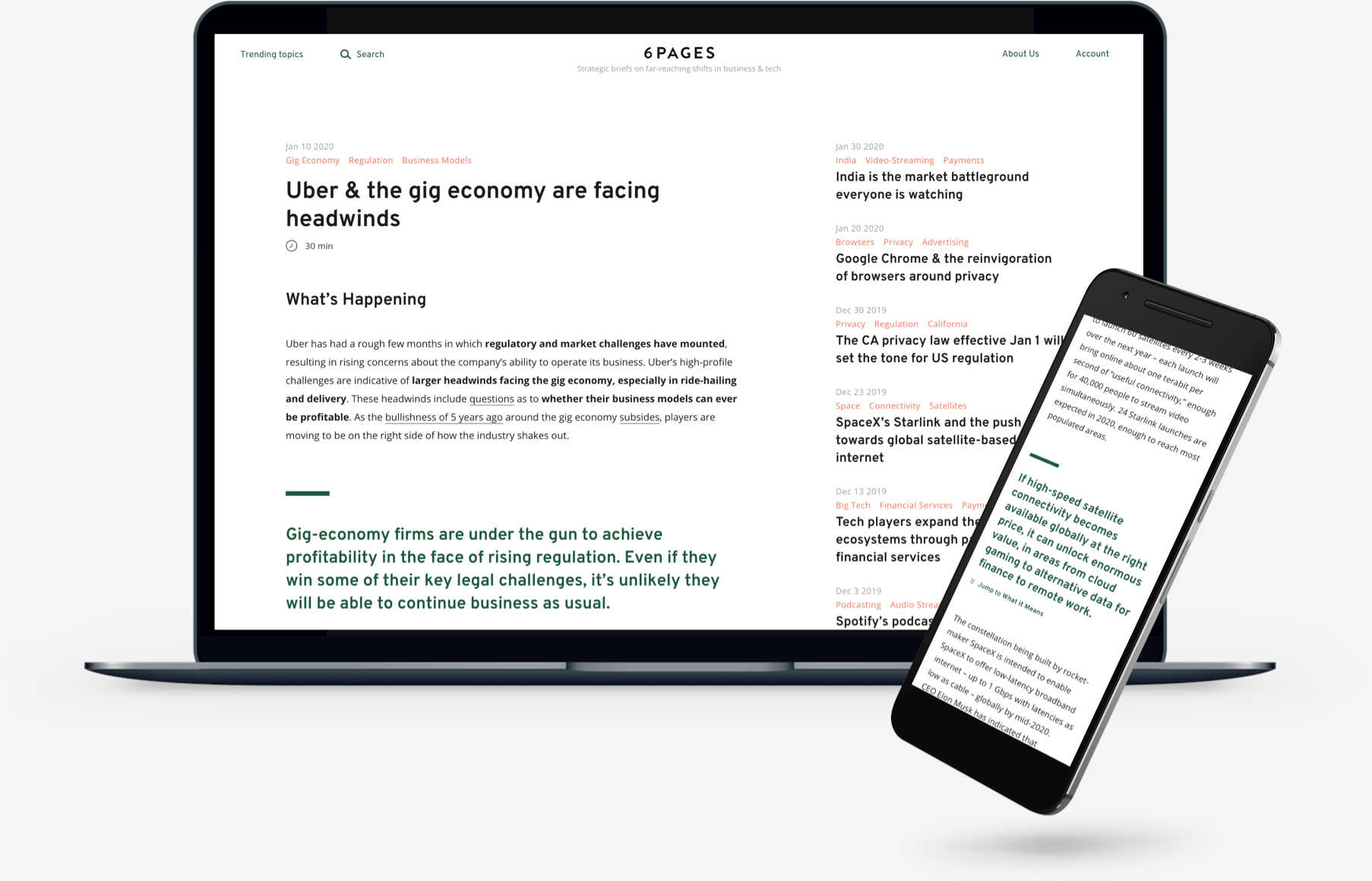“
6Pages write-ups are some of the most comprehensive and insightful I’ve come across – they lay out a path to the future that businesses need to pay attention to.
— Head of Deloitte Pixel
“
At 500 Startups, we’ve found 6Pages briefs to be super helpful in staying smart on a wide range of key issues and shaping discussions with founders and partners.
— Thomas Jeng, Director of Innovation & Partnerships, 500 Startups
“
6Pages is a fantastic source for quickly gaining a deep understanding of a topic. I use their briefs for driving conversations with industry players.
— Associate Investment Director, Cambridge Associates
Read by

Used at top MBA programs including
Apr 19 2024
13 min read
- We have entered a new era of the creator economy – one in which consumers are increasingly discovering new products through social channels, and influencers are maximizing their value capture through owning brands. In Q1 2024, funding for US creator-economy startups was up on a year-over-year basis for the first time since Q1 2022, reaching $341M. While still well below the “frothy funding party” of 2021 (when US creator startups raised an average of $1.5B per quarter), signals are suggesting renewed investor interest in creators that can parlay their social-media following into brand ownership.
- The most recent signal came two weeks ago, when YouTube stunts/comedy group Dude Perfect announced a “9-figure growth capital investment” ($100M-300M) from private equity (PE) firm Highmount Capital. (Since its start in 2009, Dude Perfect has amassed 60M+ YouTube subscribers and 17B+ views.) Dude Perfect plans to use the investment to expand its existing business lines – which includes best-selling toys sold through Walmart, branded smoothies in collaboration with Smoothie King, an ad-supported Dude Perfect streaming service, and popular live-event tours. It will hire a CEO and leadership team to run Dude Perfect “like a proper business,” and help pursue additional revenue streams such as branded consumer goods, animated shows, translated content, and even a $100M amusement park.
- Dude Perfect’s funding is a rare example of a PE firm investing directly in a creator brand. Another investment firm, The Chernin Group, has also said it plans to invest in opportunities to “build a brand around influence.” This lends credence to the growing theory that – as Marc Andreessen put it in a Dec 2023 a16z podcast – “[influencer/creator-branded things]...might be the future of consumer products.”
- There’s a history of celebrities using their fame to launch successful brands. While celebrities in the prior era might be the face of a brand or, if lucky, earn a percentage of the gross (e.g. Michael Jordan’s lucrative Air Jordan deal with Nike), a growing number of celebrities in the current era have sought direct ownership. Examples include George Clooney’s Casamigos Tequila (founded in 2010 and sold to Diageo for $1B in 2017); Rihanna’s Fenty Beauty (founded in 2017 and worth $2.8B+ as of 2021); and Ryan Reynolds’ Aviation Gin (acquired minority stake in 2018 and the brand later sold for $610M in 2020) and Mint Mobile (acquired 25% stake in 2019 and the company was later sold to T-Mobile for $1.4B in 2023).
- More recently, social-media influencers have been leveraging their internet fame to grow their brands. Kim Kardashian’s shapewear brand Skims – founded in 2018 and valued at $4B as of 2023 – was built on the back of her 360M+ Instagram followers and 75M+ X (Twitter) followers. YouTube stars Logan Paul and KSI’s Prime hydration/energy drinks brand – which launched in 2022 and has reached $1.2B in annual sales – is now landing partnership deals with the UFC, Dodgers, football club Arsenal, and WWE. The chocolate brand Feastables by MrBeast – who has the 2nd-most subscribed YouTube channel with 252M subscribers – is already bringing in $200M annually just two years after launch. Last month, MrBeast said Feastables was “basically sold out” and available in only 20% of stores nationwide (e.g. Walmart, 7/11, Target, Albertsons) after overwhelming demand.
- This approach pioneered by a small group of creators is now becoming a recognized business model. As one founding member of Dude Perfect put it, “Creators are now building out those business teams and taking a stab at products and services that are authentic to them.” Even the All-In Podcast hosts – who swore early on never to pander to advertisers – are now working on their own tequila after hearing MrBeast’s eye-opening revenue figures during his All-In Summit panel. When hiring for a new CEO, they reportedly sought to hire someone with a “background in hospitality and/or luxury brands.”
- In many categories, social media has become the primary channel for discovery, particularly amongst younger shoppers. One Aug 2023 survey found that 50% of shoppers worldwide were using social media for discovery, and an even higher 59% were using social media to buy products. Facebook, Instagram, and TikTok, not too surprisingly, are the leading platforms for social commerce.
- Platforms, recognizing this dynamic, are rolling out new features to serve influencers/brands and boost selling through their channels. Just this week, Amazon revealed that an Amazon Live livestream-shopping channel was coming to Prime Video (and Freevee), which will be interactive, shoppable, and ad-supported. Also this week, TikTok announced a partnership with ticketing provider AXS to let users discover and buy tickets to live events, similar to its existing relationship with Ticketmaster.
- However, success is far from assured. A 2023 Goldman Sachs report estimated that there are 50M “creators” globally – a figure expected to grow 10-20% annually over the next 5 years. Only 4% of global creators pull in $100K+ a year, and an even smaller number have the leverage to build their own brands.
- Even high-profile influencers are subject to brand failures. Clothing brand Something Navy from fashion influencer Arielle Charnas (1.3M Instagram followers) grew to $24M in sales in 2022, only to shut down in 2023. Even MrBeast is seeking to close MrBeast Burger after customer complaints about food quality, and is currently engaged in a lawsuit with erstwhile partner Virtual Dining Concepts.
- In addition to having to compete with other creators for consumer attention, creators face a rising competitor for eyeballs – AI. Influencers are finding deepfakes of themselves selling unsanctioned products online (as well as other nefarious purposes such as disinformation and pornography). They also face competition from more legitimate AI-generated influencers from vendors like Arcads or talent managers specializing in AI personalities. Last week, TikTok was reported to be developing a tool that can generate a written script and a virtual influencer for a video-based ad, based on an advertiser’s prompt.
- While successes such as Prime, Skims, and Feastables are driving more influencers to try to build branded revenue streams, the reality is that there will be far more failures than billion-dollar businesses. An even darker side of social discovery is that artists and creators in the traditional sense of the words – i.e. writers, musicians, painters – are now increasingly being forced to spend substantial amounts of time building a following to make a living in their chosen field, whether they want to or not. It’s not a dynamic exclusive to creators either – after all, there are now influencers in virtually every walk of life.
Related Content:
- Jul 7 2023 (Special Edition): Generative AI deepens identity as a business model
- Jun 30 2023 (3 Shifts): Steering towards TikTok-owned in-app ecommerce
Become an All-Access Member to read the full brief here
All-Access Members get unlimited access to the full 6Pages Repository of619 market shifts.
Become a Member
Already a Member?Log In
Disclosure: Contributors have financial interests in Meta and Alphabet. Amazon and Google are vendors of 6Pages.
Have a comment about this brief or a topic you'd like to see us cover? Send us a note at tips@6pages.com.
All Briefs
Get unlimited access to all our briefs.
Make better and faster decisions with context on far-reaching shifts.
Become a Member
Already a Member?Log In
Get unlimited access to all our briefs.
Make better and faster decisions with context on what’s changing now.
Become a Member
Already a Member?Log In